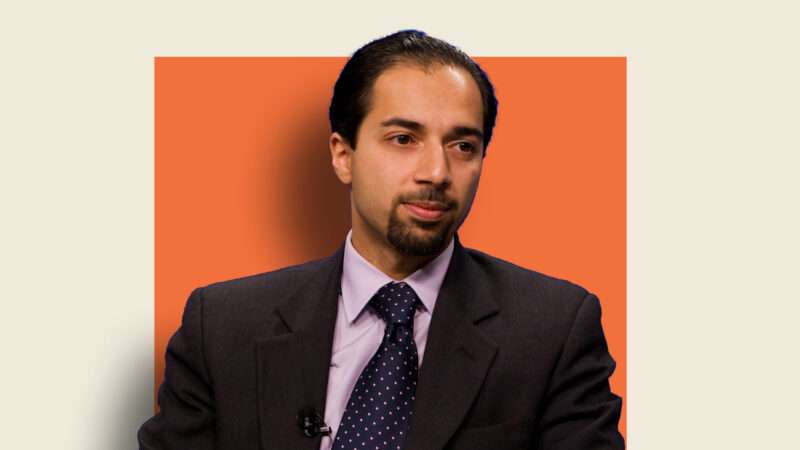Player FM uygulamasıyla çevrimdışı Player FM !
Trita Parsi: Is De-escalation Feasible in the Middle East?
Manage episode 380406458 series 2563781

This is the audio version of The Reason Livestream, which takes place every Thursday at 1 p.m. Eastern time.
"Despite clear interests on almost all sides against a regional war [in the Middle East], all sides are acting in a manner that makes such a war increasingly likely," writes Trita Parsi in an October 15 article calling for the Biden administration to push for "de-escalation" between Israel and Hamas. Parsi is the executive vice president of the Quincy Institute for Responsible Statecraft, a D.C. think tank that promotes a more restrained U.S. foreign policy. He is the former head of the National Iranian American Council and the author of several books, including A Treacherous Alliance: The Secret Dealings of Israel, Iran, and the U.S.
Parsi says that although the Biden administration is "well aware" of "escalation risks" that might lead to a broader regional war, talk of de-escalation remains off-limits. HuffPost reported late last week that it has obtained State Department memos instructing employees to avoid terms like "de-escalation/ceasefire," "end to violence/bloodshed," and "restoring calm" in press materials and statements.
Is de-escalation feasible after Hamas slaughtered Israeli civilians and continues to hold more than 200 hostages? How should Israel respond to the worst terrorist attack in its history? What can U.S. policymakers do to make the prospect of a bigger war less likely?
We discussed these questions and more with Parsi. We also revisited the topic of domestic reactions to the Hamas attack, namely the comments of a Cornell professor who claimed to be "exhilirated" by it.
Sources referenced in this conversation:
"Biden refuses to talk 'ceasefire' even though it could prevent a regional war," by Trita Parsi
"Stunning State Department Memo Warns Diplomats: No Gaza 'De-Escalation' Talk," by Akbar Shahid Ahmed
"Source: Iran warns Israel through UN against ground offensive in Gaza," by Barak Ravid
"Iran says 'preemptive action' by resistance front expected in coming hours," by Reuters
"Talks fail to let aid reach Gaza; Israel evacuates Lebanon border," by Nidal Al-Mughrabi, Dan Williams and Yusri Mohamed
"Biden is expected to request $100 billion for Israel, Ukraine and other crises," by Karoun Demirjian
The post Trita Parsi: Is De-escalation Feasible in the Middle East? appeared first on Reason.com.
314 bölüm
Manage episode 380406458 series 2563781

This is the audio version of The Reason Livestream, which takes place every Thursday at 1 p.m. Eastern time.
"Despite clear interests on almost all sides against a regional war [in the Middle East], all sides are acting in a manner that makes such a war increasingly likely," writes Trita Parsi in an October 15 article calling for the Biden administration to push for "de-escalation" between Israel and Hamas. Parsi is the executive vice president of the Quincy Institute for Responsible Statecraft, a D.C. think tank that promotes a more restrained U.S. foreign policy. He is the former head of the National Iranian American Council and the author of several books, including A Treacherous Alliance: The Secret Dealings of Israel, Iran, and the U.S.
Parsi says that although the Biden administration is "well aware" of "escalation risks" that might lead to a broader regional war, talk of de-escalation remains off-limits. HuffPost reported late last week that it has obtained State Department memos instructing employees to avoid terms like "de-escalation/ceasefire," "end to violence/bloodshed," and "restoring calm" in press materials and statements.
Is de-escalation feasible after Hamas slaughtered Israeli civilians and continues to hold more than 200 hostages? How should Israel respond to the worst terrorist attack in its history? What can U.S. policymakers do to make the prospect of a bigger war less likely?
We discussed these questions and more with Parsi. We also revisited the topic of domestic reactions to the Hamas attack, namely the comments of a Cornell professor who claimed to be "exhilirated" by it.
Sources referenced in this conversation:
"Biden refuses to talk 'ceasefire' even though it could prevent a regional war," by Trita Parsi
"Stunning State Department Memo Warns Diplomats: No Gaza 'De-Escalation' Talk," by Akbar Shahid Ahmed
"Source: Iran warns Israel through UN against ground offensive in Gaza," by Barak Ravid
"Iran says 'preemptive action' by resistance front expected in coming hours," by Reuters
"Talks fail to let aid reach Gaza; Israel evacuates Lebanon border," by Nidal Al-Mughrabi, Dan Williams and Yusri Mohamed
"Biden is expected to request $100 billion for Israel, Ukraine and other crises," by Karoun Demirjian
The post Trita Parsi: Is De-escalation Feasible in the Middle East? appeared first on Reason.com.
314 bölüm
Tüm bölümler
×Player FM'e Hoş Geldiniz!
Player FM şu anda sizin için internetteki yüksek kalitedeki podcast'leri arıyor. En iyi podcast uygulaması ve Android, iPhone ve internet üzerinde çalışıyor. Aboneliklerinizi cihazlar arasında eş zamanlamak için üye olun.




